Sarahbeth Caplin's Blog, page 34
May 25, 2016
It was never about bathrooms, or protecting women and children
Continuing the thought process of my previous post, I want to clarify a few more things regarding evangelical hypocrisy as to who can use which bathroom at Target, the concern over which is supposedly about “protecting” women and children:
Bob Jones University, a Christian college, reportedly blamed sexual assault victims – not their abusers – even when the assaults were committed on their campus by so-called “Bible believing” male students.
John Piper, a much-revered Calvinist theologian, gave a sermonette on why it’s in a woman’s best interest to stay in an abusive marriage.
Jim Bob and Michelle Duggar, the patriarch and matriarch of 19 Kids and Counting, were found to have covered up abuse allegations in their own home for years before their oldest son Josh was finally outed for his crimes.
Mark Driscoll, pastor of Mars Hill Church, mocked effeminate pastors, and his supporters responded to the outcry by requesting we all “show him grace” because “none of us is perfect.”
Those are just a few examples of situations in which women and children were clearly in danger, or blatantly disrespected. But where were the protests on the Bob Jones campus, demanding justice for rape victims? When did we ever hear about massive withdrawal of donations from alumni? When was there a public boycott of Piper’s books and the Duggars’ reality show, let alone the TLC network for putting them back on the air?
Plenty of Christians have protested, boycotted, and denounced that school, those “leaders,” and their products. But not nearly to the same extent we are seeing in response to Target’s policy that permits trans customers to use the bathroom that best corresponds with their gender.
A few more anecdotes:
The same people who are horrified at sharing a bathroom with trans people are often the same people promoting purity culture. These same people are the ones encouraging women to cover themselves up so men won’t “stumble”; they are the same people who have forced rape victims to make public apologies for their own sexual assaults.
These same people who are such crusaders for women’s health and vitality are staunchly against sex education in public schools, against government programs that help the poor, and against Planned Parenthood – the largest organization in the US to provide affordable contraceptives, thus preventing more abortions than they actually carry out. These same people often praise pointless suffering, and call themselves “pro life” when in reality they are just “pro birth.”
These same people who are supposedly “for children” would rather leave kids in the over-burdened foster system than be adopted by loving, responsible gay parents.
These same people blatantly ignore the statistics that prove sex education is more effective than shame-based abstinence programs, which have been known to compare women who have sex outside of marriage to used pieces of tape or chewed-up gum.
Finally, where are the swarms of protestors outside the Vatican, where pedophile priests can hide from justice, and have done so for decades?
The vitriolic reaction to Target’s bathroom policy really isn’t about bathroom safety, just like Jim Crow laws were never about drinking fountains. These people do not give a damn about the safety of women and children, and are using the façade of concern as a veil to hide their bigotry.
Filed under: Feminism, Rape Culture, Religion Tagged: Christian culture, Christianity, Controversy, evangelicals, Feminism, rape culture, social justice, Spiritual Abuse








May 23, 2016
Humility: the forgotten evangelical virtue
 You can identify them by their fruit – that is, by the way they act. Can you pick grapes from thornbushes, or figs from thistles?
Matthew 7:16
You can identify them by their fruit – that is, by the way they act. Can you pick grapes from thornbushes, or figs from thistles?
Matthew 7:16
This “fruit” has many definitions: empathy, service, compassion. But the one I want to address is a particularly thorny one: humility.
You’ll never hear anyone seriously say, “I’m so great at being humble.” Most of us aren’t. Humility requires taking responsibility for things we’d rather sweep under the rug. Sometimes humility requires admitting we were wrong about something. That’s not easy to do.
But then, nothing Jesus asks of his followers is supposed to be easy.
Recently, an acquaintance shared an article from Charisma magazine on Facebook about transgender acceptance (or lack thereof). If you are familiar with this magazine, you know it’s a fear-based publication that thrives on conspiracy theories about how Christians are constantly under attack in the United States. Facts – particularly scientific facts – are not a priority for Charisma writers. But when it comes to disproving the validity of the transgender “agenda,” suddenly this article is all about the science. I have to say that’s pretty convenient, especially considering that no citations for these ‘scientific facts’ were given.
That’s not humility. That’s cognitive dissonance at best, and justification for bigotry at worst.
Here’s a particularly unpleasant fact: 80% sexual assaults are committed by someone the victim already knows. This could be a friend, a relative, even a pastor. This means that, statistically, women and children are 80% more likely to be molested in church than in a public restroom. One need not do more than turn on the news to learn about religious public figures caught in sexual “scandals,” or the complete mishandling of sexual assaults that occur on Christian college campuses. The above statistic is proven every day the more these stories are exposed, and there are an untold number of these stories that will never make it to the news, much less outside the home or church walls.
Humility is admitting that many Christians have a bad history of handling abuse cases, and brainstorming what can be done to fix that. Misrepresenting facts, or ignoring them altogether for the sake of self-preservation, is pretty much the opposite of humble.
When Christians are “caught” and exposed as abusers and law-breakers, a common response in the evangelical community is Well, he/she must not be a True Christian™ . The doctrine of daily sanctification seems to be at odds with the teaching that humans will never not be sinners on this side of heaven. In evangelical tradition, all sins are equally offensive, yet the exposed rapist is denounced by the No True Scotsman fallacy while the gossipers and gluttons are excused as being “works in progress.”
This is nothing more than a defense mechanism for churches to save face. It’s far easier to hide the dirty laundry than take responsibility for it, and even go so far as to admit that dirty church laundry often stinks just as much as secular laundry. And yet, the example of Jesus calls – no, demands – that Christians be humble. In this case, the right choice is obvious because it is the harder choice. Come on, Christians. Time to act like grown-ups and pick up our collective cross. Yes, it’s heavy, but that’s kind of the point.
A sign of a strong, healthy family dynamic is when members take responsibility for their own. And yet this is not what happens. You don’t denounce your flesh and blood for screwing up; you work with them so they can get the help they need. The Christians who screw up are still ours.
It would be easier to denounce those screw-ups as fakers if only there weren’t so many of them. Like it or not, Christianity is littered with rapists, murderers, embezzlers, and wife beaters. It’s time to acknowledge this and ask ourselves why our faith has a reputation for being cruel and deceitful. If the adage is true – that church is a hospital for sinners, not a museum of saints – let’s stop acting so shocked when our members are outed as sinners. What favor are we doing our witness by denying they were ever truly “saved” in the first place? Under the right circumstances and environmental conditions, none of us is truly incapable of anything.
I cannot tell you how many of my atheist and agnostic friends would respect Christians a lot more if we could stop making excuses and own our shit.
By and large, I know more Christians who give me hope and encouragement than the scary ones who make me want to flee. But the lack of humility and self-awareness I’m seeing from Christians on the news and in my Facebook feed is terrifying, and it’s time to start holding them accountable.
Filed under: Religion Tagged: Christian culture, Christianity, Controversy, evangelicals, grief, rape culture, social justice, Spiritual Abuse








May 15, 2016
My own brush with Religious Trauma Syndrome
After so many years of church and church authorities providing the answers to all of life’s questions, within an environment that condemns voicing doubts regarding matters of faith, the person who leaves often feels psychologically and mentally stunted, and incapable of making life decisions. In a very real way, they must re-create their identities from scratch. This core uncertainty and brokenness forms the basis of RTS [Religious Trauma Syndrome].– The Hidden Trauma of Life After Fundamentalism
 I didn’t grow up fundamentalist, so I can’t relate to the above quote quite the same way as someone learning to overcome a lifetime of abusive spirituality. I’ve made friendships with bloggers whose stories are jaw-droppingly shocking to the spawn of Yankee Jewish liberals (that’s me, in case you’re new here). But all my years of college and seminary indoctrination sure felt enough like a lifetime.
I didn’t grow up fundamentalist, so I can’t relate to the above quote quite the same way as someone learning to overcome a lifetime of abusive spirituality. I’ve made friendships with bloggers whose stories are jaw-droppingly shocking to the spawn of Yankee Jewish liberals (that’s me, in case you’re new here). But all my years of college and seminary indoctrination sure felt enough like a lifetime.
Two major life events occurred during those harrowing years of breaking free of fundamentalist damage: I ended an abusive relationship and watched my father die from cancer. Those things are enough to fuck up any person, religious or otherwise, but the effects of faith on the latter event are my breaking point. In my life, mental illnesses are like Pringles: can’t have just one!
My family felt an odd mix of grief and gratitude after Dad’s death. The gratitude was only because he wasn’t suffering anymore – supposedly. For a person struggling to break up with fundamentalist theology, I couldn’t draw comfort from that line of thinking. According to the theology I lived by since sophomore year of college, my father’s suffering in hell was just beginning, because he was Jewish. The cancer came and went over a period of thirteen years, and you would not believe the number of Christians I’ve encountered over the years who “warned” me about his eternal fate as casually as one might say, “Pass the potatoes.”
I can only imagine those Christians shaking their heads if they’re reading this, probably wishing they could say to me “Well, the road to salvation is deliberately narrow. The truth sometimes hurts. If you have an issue with that, take it up with the Lord.”
That last line is the hardest verbal slap. It’s the ultimate conversation-stopper, because you can easily disagree with people and try to prove them wrong, but once God and capital-T Truth are brought up, that’s it. You lose. No argument or appeal can possibly trump God, and the shame of wrongdoing is passed on to me: this is really your problem because you just don’t understand God’s ways.
I need to be completely honest about the effects that this kind of thinking has had on me. For the sake of appearing like a faithful servant of God, I could never let anyone know what I really felt. I could never let anyone know that:
The thought of being held responsible for my dad’s salvation, and having to answer on my Judgment Day why I let that go because Dad was “uncomfortable” talking about matters of religion, was such a heavy burden that it gave me panic attacks. I practically begged my doctor for Xanax.
I never understood why none of the good my father did in his life, none of the positive impact he had on people mattered, because it was all done outside of Jesus, and therefore amounted to nothing.
The thought of Dad suffering beyond human comprehension for eternity when his last months were hellish enough are partly what put me in AA. When a family friend sent me an email just a few days before he died, telling me my chances to “save” him were limited and I needed to hurry up, I was so triggered and so furious I told her to go to hell. The irony? She didn’t understand my anger at all, because in her world, she was doing the most loving thing imaginable.
I’m now one of the increasing thousands of fundamentalist “survivors” struggling to discern which parts of religion are safe and good enough to keep, and which parts are so abusive and toxic that they must go.
That’s what this struggle is about: breaking free from abuse and piecing together a new identity. It is not cherry-picking which parts of Christianity we like and cutting out the rest. I know that is exactly how some Christians will view this struggle: a selfish process that’s all about individual pleasure and comfort. Well, if “comfort” and “pleasure” amount to having normal blood pressure, going to bed sober, and being able to walk past a church without breaking out in hives, I’d hate to see what their idea of selflessness looks like.
I’m sure readers of my next book will finish feeling somewhat confused: so is she staying, leaving, or what? Spoiler alert (as if the title, Confessions of a Jew-ish Skeptic, wasn’t indication enough): once again the ending is vague on purpose. To write a “conclusion” to a faith journey at any point before death, but especially at 27, is ludicrous (as is writing a second memoir before 30…well, I never claimed to be normal, did I?).
The truth is, I don’t want to give up on faith. I don’t want to walk away from God. Religion has not been all toxic to me; in fact, most of it hasn’t. People find foundation for identity in many places, and religion has always been mine. That is, for the most part, where I find peace and purpose.
At some point in the future, I may write a post about the difficulties of developing faith in a society that is heavily Christianized almost everywhere you go. I’d be in a lot of trouble if I were still hell-bent (heh) on living a devout Jewish life. Where I live, that’s dropping seeds on completely dry, infertile soil. If not for the campus Hillel, I’d be a complete lone ranger.
I won’t keep writing books about being spiritually confused forever, but I will keep blogging about the process of digging myself out of fundamentalist muck. I hope I’ve cultivated a safe enough space here where maybe no one’s deep, complicated questions will get answered, but at least there will be community.
Perhaps I should call it The Church of “Me, too.”
Filed under: Religion Tagged: Author Sarahbeth Caplin, Campus Crusade for Christ, Christian culture, Christianity, Controversy, depression, evangelicals, grief, hell, Judaism, memoir, self-care, Seminary, social justice, Spiritual Abuse, Writing








May 10, 2016
#MaybeHeDoesntHitYou: not all abuse is violent
#MaybeHeDoesntHitYou is such an important and heartbreaking hashtag. If you can handle it, migrate over to Twitter and look at some of the posts. Some issues require breaking your heart a bit to fully understand them.
I’ve engaged in what my friend Samantha calls “Oppression Olympics” before. The goal is to see whose story is most devastating, most shocking. I can only guess that victims of domestic violence and rape participate in this as a response to the criticism and judgment they get from the media, law enforcement, and relatives.
A paper cut is different from a broken leg, obviously, but hurt is hurt. Disrespect is disrespect. Physical wounds can heal, but words often stick. You’d be hard-pressed to find a story of abuse that doesn’t begin with emotional abuse first. Some relationships stay at that level while others escalate into physical and sexual violence, but damage is damage. The idea of quantifying pain and suffering just does not make sense to me. You can’t define the level of hurt that someone else is “supposed” to feel. If you care about the problem, your only job is to listen and say, “I believe you” and “This is not your fault.”
In my experience, Jason never hit me, but…
Told me to walk several steps behind him in public so people wouldn’t think we were “together”;
Used “You owe me,” “You’d do it if you loved me,” and other forms of emotional manipulation to guilt me into sexual things I didn’t want…and then went days without speaking to me to “punish” me;
Got pissed if I called him while he was out with his friends, but if he called me while I was out with mine, and didn’t answer, I’d get “Where are you? Why aren’t you picking up? Why aren’t you talking to me?” messages;
Invited me over to watch a movie and pushed me to the opposite end of the couch when his family came home unexpectedly, and proceeded to act like I wasn’t there…and then chased me down his driveway when I tried to leave, grabbed my arm and demanded to know what my problem was;
Stared at the ground when I introduced him to a friend of mine, then spit out his gum, put it in my hand, and said “Throw this away for me” before walking away…and then played the “I’ll never be good enough for you” card when I called him later that day to reprimand him for being a complete asshole (not to mention humiliating me in front of the friend who had been told story after story of how “wonderful” he was);
Thought he was “compromising” by asking me to just take off my shirt since I didn’t want to fool around, and then insisted I was “lucky” that he didn’t ask for more than that…and then yanked it off for me when I wouldn’t do it myself.
Can you read all of that and not tell me I was abused even if he never left a mark on me? Can you read that and understand why it took me years to develop an iota of self-esteem, which I’m still working on even after marrying an incredible man who treats me like a human being? Can you understand why it blew my mind that my husband eagerly held my hand while we were dating, and proudly introduced me as “My girlfriend, Beth” to everyone he met?
If your first response to someone who was abused without ever being physically hurt is “That’s not THAT bad” or “It could have been worse,” you are a proponent of rape culture. Don’t be that person.
On that depressing note, I have to close with something happy. This was taken a few months before we got engaged:
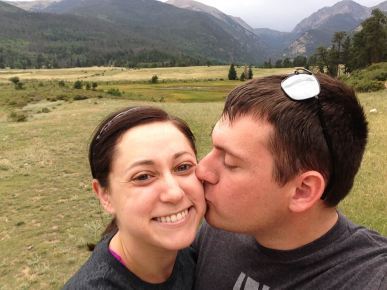
I’m a person who can’t fake smile for pictures, but look at my face in this. So full of joy. So full of love. Everyone deserves a partner who makes you feel like that.
Filed under: Feminism, Rape Culture Tagged: depression, Feminism, grief, rape culture, self-care, social justice








May 9, 2016
I’m tired of abusive religion
I took a big risk and decided to be vulnerable in my latest memoir. The hard fact is that I couldn’t accurately talk about my faith struggles without describing the events that influenced the way I relate to God: namely, the rape and the abuse. Those things are absolutely critical to the way I related to God for years, and to this day I have a bend toward self-deprecating worship.
You know what, though?
I’ve had enough of that. And I’m really tired – no, more like angry – to see so-called human depravity glorified with catchy songs and slogans. Abuse survivors and depression sufferers just do not need this crap.
I’m not saying I don’t believe in sin. And I don’t consider myself a “good person.” But I do believe there is a world of difference between “not good” and “utterly depraved.” And I no longer see the need to dwell on my horridness to emphasize God’s goodness. I honestly cannot recall a church environment I’ve been to in which God was praised just for being God, without having to bring “But I’m so unworthy” into it.
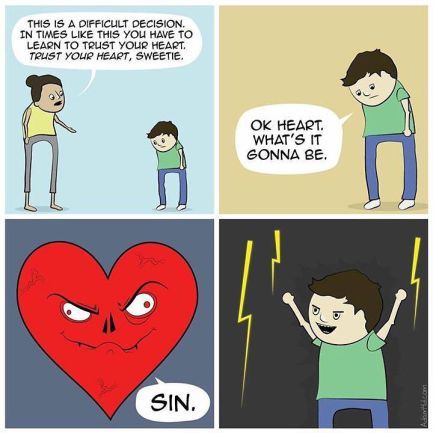
The comic artist sells the bottom left “evil heart” logo as a t-shirt in his online store.
Good marketing, huh?
I heard all about my unworthiness countless times in the five years I dated my last boyfriend, in words and through actions. He gradually taught me to hate myself. When I hear young, otherwise happy women in bible studies and small groups flippantly talk about their depravity, something in me breaks. I can’t help but think that this teaching is making them ripe for falling into the clutches of abusers (see When God talks like an abusive boyfriend).
I don’t say this to minimize the consequences of sin (though I admit I still struggle with the Jewish/Christian dichotomy between sin as action and sin as identity). I say this because I don’t see nearly enough affirmation of the worth of human beings in church (in this context, I’m referring to evangelical churches).
The Christianity I read about in my teenage years affirmed God’s passionate pursuit of humans. That Christianity showed a God whose heart broke to see his creation quantify their worth by their income, their social status, their number of relationship partners. That Christianity showed a God who used Jesus to say You don’t have to do anything to earn my love, you already have it! I made you and think you’re awesome!
The Christianity I encountered in college was radically different. It was a Christianity that said You’re disgusting. You’re pathetic. God sees filth when he looks at you. Only when you become a Christian do you deserve to be looked at with a little less contempt.
Many Christians espouse the latter rhetoric and wonder why their numbers are dropping.
True, the word “love” is often misunderstood. But when Christian “love” looks a lot like condemnation, there is a problem. “Tough love,” on the other hand, often feels unfair, but that’s generally reserved for drastic circumstances; it’s not the kind of love you start out with. When starting a new relationship, you focus on what you find attractive about a person. You tell them what you like about them. You know they have flaws, and you might work with them to improve, but healthy relationships don’t use degradation to get someone to change.
I want a God who will challenge me, convict me of my wrongdoing, and enable me to let go of bad habits. But I’m running far, far away from the God who supposedly created me, made me “fearfully and wonderfully made,” yet thinks I’m a parasite.
To that I say, enough.
Humans deserve better.
Filed under: Religion Tagged: Author Sarahbeth Caplin, Campus Crusade for Christ, Christian culture, Christianity, Controversy, depression, evangelicals, grief, Judaism, memoir, self-care, Spiritual Abuse








May 6, 2016
I still can’t participate in National Day of Prayer
This is for the woman who gave me the stink eye when she overheard me say to my husband, “This is ridiculous.”
What’s ridiculous? The suggestion that we as a church group go out about the town – to bars, restaurants, wherever – and pray, in honor of National Day of Prayer.
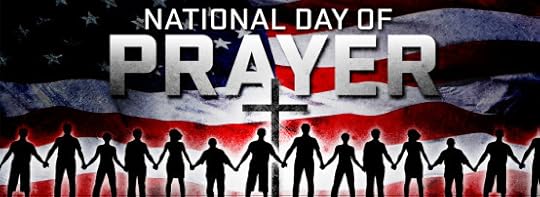
Though if I’m being completely honest here, part of me wanted to be overheard. This is one instance of a cultural Christian phenomenon that is normal and/or celebrated among many American Christians, and it’s one instance that makes me turn up my nose and think I’m so much more mature than these people. Yes, more mature than these people who have been Christians all their lives, while my faith is transitioning from diapers to pull-ups. I know it’s not a very Christ-like way to think, and I’m calling myself out on it.
Yet part of me wanted to be overheard because I’d wager that just about no one in our young adult small group can comprehend what an event like this is like for people on the outside of the Christian faith. They probably can’t see beyond their good intentions – and I know they had good intentions – how an event like this might be damaging to the witness they are hoping to demonstrate.
In many ways, I’m still an outsider. Events like National Day of Prayer force me to once again come to terms with an uncomfortable fact about myself:
Even after all these years, I am still too Jewish to fit in in church, yet too Christian to feel at home among other Jews.
When I hear “Let’s go around town to pray in honor of National Day of Prayer!” I interpret that as Let’s show off our Christian privilege by making everyone else feel awkward.
When I hear “We need to pray to bring this country back to God,” I hear We need to pray to make America a theocracy so people like you, and your family, don’t feel welcomed here.
Even the title itself – National Day of Prayer – implies specific Christian prayer. It tells me If you’re not praying to Jesus, your prayers don’t count.
I am still conditioned to interpret every Christian idea through Jewish lenses. The suggestion of gathering for public prayer confirmed this, because I’m still too conscious of what it’s like to be an outsider. And I cannot do anything that will reinforce that feeling for anyone outside my ‘circle’ without feeling like a hypocrite.
Because in my tradition, prayer is a private, personal thing – unless it’s part of a group chant in synagogue.
Because in my tradition, we’re used to having to fend off missionaries who learn from their pastors how best to “reach” us, without ever getting to know us and what we believe about the Bible. And events like this often include prayers for national conversion.
Because even today, the phrase “my tradition” and the pronoun “us” in Judaism still make sense. I’m not exactly part of an “us” to many Jewish communities anymore, but let’s face it; I’m not part of the “us” in many Christian communities, either.
My desire to be inclusive makes me “liberal” (a dirty word in many churches). My apprehension to do anything outside of my normal behavior to draw attention to my faith makes me “ashamed” of the gospel.
I could have found more productive ways to explain myself instead of flippantly, indiscreetly expressing my negative opinion. And even if that woman never reads this, I needed to write it for myself, and for anyone else who might have overheard and thought What kind of Christian is anti-prayer?
I need to make it known that I’m absolutely not anti prayer. I am anti peer-pressure-to-do-something-that-feels-like-public-nudity because I come from a long tradition in which prayer is intensely personal when not done in a house of worship. Add on to that the pressures that come with being an introvert living in a faith culture that is catered to extroverted personalities.
When I’m pressured to make my faith more public than what is natural, my instinct will always be to hide. When I’m pressured to perform in a way that is contradictory to my nature, my gut reaction will be I CAN’T EVEN WITH THESE PEOPLE.
So that, in a nutshell, is why I did not participate in the National Day of Prayer – at least, not publicly. And this is my impassioned plea to anyone tempted to use the No True Scotsman fallacy against me because my faith in practice looks different from theirs: please do not conflict faith culture with faith itself. It is not hypocritical to love one and despise the other.
In fact, Jesus had some words to say about public versus private prayer:
When you pray, go into your room, close the door and pray to your Father, who is unseen. Then your Father, who sees what is done in secret, will reward you. Matthew 6:6.
If you can relate to this post, be sure to check out Confessions of a Jew-ish Skeptic, now available for pre-order.
Filed under: Religion Tagged: Christian culture, Christianity, evangelicals, Judaism, social justice








May 5, 2016
Jewish hair, Christian faith: excerpt from ‘Confessions of a Jew-ish Skeptic’
 My one-time experience at a Jewish sleepaway camp (I know, I know, don’t get me started on the absurdity of the phrase “Jewish camp”) was full of, shall we say, unique experiences: from a production of The Sound of Music featuring nuns with popsicle-stick Stars of David instead of crosses to lively debates about who looked “most Jewish” and who could pass for a gentile. In that contest, I ranked somewhere in the middle with my coffee-brown curls and pale skin. The winner of the Most Likely to Pass for a Gentile award was a tall, blonde, blue-eyed girl who was half-German, half-Swedish. Before camp, I had no idea such a Jewish person could exist without the help of colored contacts and hair dye.
My one-time experience at a Jewish sleepaway camp (I know, I know, don’t get me started on the absurdity of the phrase “Jewish camp”) was full of, shall we say, unique experiences: from a production of The Sound of Music featuring nuns with popsicle-stick Stars of David instead of crosses to lively debates about who looked “most Jewish” and who could pass for a gentile. In that contest, I ranked somewhere in the middle with my coffee-brown curls and pale skin. The winner of the Most Likely to Pass for a Gentile award was a tall, blonde, blue-eyed girl who was half-German, half-Swedish. Before camp, I had no idea such a Jewish person could exist without the help of colored contacts and hair dye.
I never knew whether to take offense when people occasionally told me I “looked Jewish.” I imagine it’s somewhat similar to being told you “look gay”: it’s offensive, a compliment, or a casual observation, depending on who says it. But how can it be offensive if it’s true? I am Jewish, ethnically speaking. My heritage is a mix of Polish (my last name, pre-Ellis Island, was Czaplinski), Russian, and a dash of German. As previously mentioned, I check off Ashkenazi any time it’s required for an accurate assessment of my medical history, and with that background comes an expectation – read, stereotype – of physical appearance. But don’t all stereotypes begin with a grain of truth?
Growing up, it was not my so-called big nose or thick eyebrows that gave me grief over my Jewishness, but my thick, unmanageable curly hair, which only decided to be curly on some days. The only consistent thing about it was its poofiness, frizz, and tangles. When a stylist commented, “You have enough hair for three people!” as I settled into her chair, I cried. I was nine years old at the time, just hovering at the edge of preadolescence, when having the right look started to become very important. For me, that “right look” was shiny, fine straight hair like my friends in ballet class had. Their buns looked smooth and effortless; mine threatened to burst like a shaken soda can with the release of a single bobby pin.It’s not an exaggeration to say that hair has a huge impact on one’s identity and self-esteem, and living in a culture that worships shiny, straight hair as the ideal standard of beauty certainly doesn’t help.
My battle for curly hair acceptance began three years before that moment at Great Clips (which made my mother realize it was time to join her at an official Grown-Up Salon) when a ballet teacher told me my bun wasn’t smooth enough. Well, news flash: curly hair is anything but smooth! I ranted for days on end when The Princess Diaries heroine, Mia Thermopolis, received a “royal makeover” that turned her wild mane sleek and unnaturally straight. Couldn’t those royal stylists, with every kind of product supposedly at their disposal, have given her a different haircut and recommended a special shampoo and leave-in conditioner instead? Why enforce the idea that curls somehow equal disorder and sloppiness?
Today, it’s somewhat of an embarrassment to admit that part of my acceptance of being Jewish happened when I learned to properly care for my hair. To me – and to anyone belonging to an ethnic or cultural group marked by a very specific kind of look – having the right hair could make or break an effort to assimilate. A jab about frizz can be a jab about who you are as a person, and where you belong.
To that end, the limitations and boundaries about the appropriateness of cultural jokes are still blurry. I can make jokes about the “Jewfro” I had when I was six, but if someone else makes a similar comment, does that make it anti-Semitic? And today, is it fair to say that my beliefs may be Christian, but my hair never will be?
To be born into a particular heritage is a critical piece of identity that you don’t get to choose. That piece was decided for me by fate, before I could develop the cognitive ability to form my own beliefs. If the Jewish piece of me is something that “just is,” was I right to be somewhat offended when someone told me during a church retreat, “I thought you looked Jewish!”? She was merely stating a fact, not an insult…right?
For some of us, how we look cannot be completely severed from who we are. There are so many ways to assimilate before coming to terms with the radical thought our natural states are the way we are meant to be.
Confessions of a Jew-ish Skeptic is now available for pre-order: amzn.to/1SJAQxs
Filed under: Religion, Writing & Publishing Tagged: Author Sarahbeth Caplin, Christian culture, Christianity, Controversy, Judaism, Writing








April 30, 2016
In other news, publishing is wild and unpredictable
As I prepare to click “publish” for a sixth time (technically seventh, but my first novel, Someone You Already Know, is no longer in print), I reflect once again on my four-year publishing journey…especially since I found out yesterday that A Stunning Accusation’s publisher, Booktrope, is closing its doors at the end of next month. Booktrope was my first experience in traditional publishing, and I’m sure it won’t be my last. This is an unexpected hurdle as I continue working feverishly hard to produce Confessions of a Jew-ish Skeptic, but that’s the writing life, isn’t it? It’s never easy or predictable, and I knew that going in. As the expression goes, what’s past is prologue.
Part of being a writer – particularly an indie writer – is keeping your expectations grounded in reality. This is generally true of adulthood, as well: my husband and I are floored at the prices of two-bath, two-bedroom condos in our area, and have downgraded our expectations for our first home enough so we no longer expect to have a yard, a two-car garage, or a guest bedroom. We will instead be pleasantly surprised if we can afford those things, but they are no longer part of “the dream.”
In the same way, I’ll be pleasantly surprised if I can pay for more than a few tanks of gas here and there with my writing. Not because I don’t think I can do it, but because it’s a tough business. Thousands of books are self-published each year, and religious nonfiction just cannot compete with the popularity of romance, erotica, or fantasy. My goals have downsized from New York Times bestselling author to making sales that are steady enough to buy more than a few Starbucks lattes per month.
Let me tell you, I’ve worked incredibly hard just to get that far. And if I continue to do what I’ve been doing – networking with other authors, commenting on blogs that are related to what I write about (which builds relationships with future readers), engaging on social media, updating my own blog, and writing posts for other blogs and media outlets – my business can only improve. And no matter how you publish, it is still a universal truth that the best way for authors to sell books is to keep churning them out. Whether it’s a novel a year or Kindle novellas, giving readers more to choose from is always a good thing (assuming it’s all professionally put-together and such).
While I’m incredibly grateful for the readers of this blog and everyone who’s taken time to read and review my books, I still get hit with self-doubt that I’ll never “make it,” though “making it” looks different for everyone and I’m still figuring out what that looks like for me. But doubt is always in the back of my head when working on a new project. I’ve spent more money advertising my books than I’ve earned back in royalties. I’ve paid to have my books placed in brick-and-mortar bookstores for several months, and earned under ten dollars in return. But I have to remind myself that at least I’m still earning something, while many writers do not. I cashed that bookstore check, and treated myself to Chick Fil A.
I also have to remind myself that four years in publishing seems like a long time to me, but in the grand scheme of things, it’s really not. Not if I plan to keep writing for the rest of my life. Simply put, I haven’t been doing this long enough to earn the right to complain about low sale rates. And I realize that I am damn lucky to make this a full-time job while my husband brings home the paychecks we live on – not to mention health insurance. If I were single, I’d be living off food stamps. I can never stop being grateful for the opportunity to stay home and write, market, and write some more.
So while things seem uncertain right now, this is not much different than the bumps that can occur with any other job. Companies go out of business all the time. Good employees get laid off. Life happens, shit happens, and we keep looking for other avenues to use our skills. More to the point, not everyone ends up in a field they are passionate about – talk about lowering expectations to match reality when the only job that puts food on the table is one you hate. I’m far from the only one feeling jaded, and having to supplement the work I really want to do with a day job that pays more. If there’s any big lesson I’ve learned over the last few years, it’s this:
You are not defined by what you do.
YOU. ARE. NOT. DEFINED. BY. WHAT. YOU. DO.
Not to mention that what you “do” does not have to be equivalent to how your bills get paid. Even if I end up supplementing my income with, I don’t know, bar tending, I will always say I’m a writer when people ask about my career. I mean, how else will people know my books exist?
Bottom line: adulthood is a rat race, and we’re all just trying to get by. So if you make good money in a field you love, count your blessings. If you don’t, just know that your work “title” doesn’t say anything about your worth or the gifts you have to offer.
 As for Stunning’s future, my plan is to self-publish with a new ISBN and cover as soon as I can – I already emailed the epub to the formatter who worked on my other books, and sent a handful of stock images to my cover artist. This is all in the interest of preserving my Amazon reviews, which will disappear once Booktrope pulls the book for good. I don’t think I can pitch an already-published book to agents, so that leaves self-publishing as the only option to keep the story alive. And this is a story I believe is worth keeping, because I feel it’s my best work of fiction, and its messages about rape culture are so relevant.
As for Stunning’s future, my plan is to self-publish with a new ISBN and cover as soon as I can – I already emailed the epub to the formatter who worked on my other books, and sent a handful of stock images to my cover artist. This is all in the interest of preserving my Amazon reviews, which will disappear once Booktrope pulls the book for good. I don’t think I can pitch an already-published book to agents, so that leaves self-publishing as the only option to keep the story alive. And this is a story I believe is worth keeping, because I feel it’s my best work of fiction, and its messages about rape culture are so relevant.
If you haven’t read the original, now is the time to purchase it before it becomes a collector’s item on May 31st.
Filed under: Other stuff, Writing & Publishing Tagged: Author Sarahbeth Caplin, Indie Author Life, rape culture, self-publishing, Someone You Already Know, Starbucks, Twitter, Writing








April 27, 2016
Do I stay or do I go? ‘Jew-ish Skeptic’ excerpt
The beginning of the end of my time as a seminarian was in a small classroom of less than a dozen students. Week after week, students were asked to lead the class in prayer before the lesson began, and week after week, I dreaded when it would be my turn.
I’m not here to become a pastor, I thought. At the time, I believed God was calling me to be a crisis counselor. So why was praying aloud mandatory? Why couldn’t introverts have a different set of expectations?
When my turn came to pray, I wondered if maybe, just maybe, I could fake it for a day – “fake it to make it,” as the expression goes. How hard could it be? If I adjusted my tone and my volume, I might be able to convince the class that I do this all the time.
In the end, authenticity won. I couldn’t pretend to be good at something I wasn’t; couldn’t pretend to excel at something I had been taught all my life was a private, personal affair. “I’m sorry,” I told the professor, “but I’m not comfortable praying out loud.”
“Why not?” she asked, incredulous, as the other students turned to stare at me. You’d think I had done something far more scandalous, judging by the facial expressions of my peers.
“I’m just not comfortable with it,” I edified, feeling my face turn several shades of red.
“I’ve never heard of such a thing,” the professor said, the other students half-smiling in agreement. She let me pass on the public prayer – but not before shaking her head in a way that let me know my request was not normal.I wish I could say that was my only brush with awkwardness at seminary, but it wasn’t. That same semester, there were people who questioned the authenticity of my worship during mandatory chapel because, again, I wasn’t comfortable raising my arms during the music. There were people who chafed when I explained how the word “unbelievers” is not part of my vocabulary, either, because it implied that people who aren’t Christian have no beliefs at all. And then there was the Christian guy with the “heart for Israel” who believed God had sent me to be his Jew-ish missionary wife (the second time in one year that that had happened to me). He later called me a heretic during a lecture when I challenged his interpretation of Isaiah 53.T
That was a defining moment; perhaps the final nail in the coffin of my seminary experience. All students, regardless of concentration, were required to take biblical history classes, and one of the last courses I took happened to dissect several Old Testament prophecies believed to point to Jesus. None of them seem to foreshadow Jesus better than Isaiah 53, better known as the passage of the suffering servant. The verses clearly describe a man being “pierced for our transgressions,” which sounds a lot like crucifixion. Except my understanding of that passage, per my limited Jewish education, is that the “suffering servant” is referring to the Jewish people as a whole. Historians have commonly used the male pronoun “he” to refer to all Jews as a single unit. Rabbis interpret the passage as prophesizing the future state of Israel.
Quite honestly, as a Christian, I sometimes wish I never heard that interpretation, as it tends to open a smelly can of worms in Bible studies. You can imagine just how unkindly the average Christian will accept that what seems like such an obvious passage may not be talking about Jesus at all. I found myself in a mental tug-of-war, wanting to follow the majority who read the Old Testament with Christian glasses, because it was an easier path to take. But then my stubborn inner Jew scoffed at the knowledge of missionaries who purposely mistranslated passages to confuse and convert Jews, and who understands the Old Testament better than Jewish scholars, anyway?I figured if my people had erred in interpreting the prophecies, they’d have owned up to the mistake by now. It’s been a few thousand years, after all.
I wish I could say I’ve figured this all out, but I haven’t. The Prophecy Dilemma is yet another subject to be filed in the “I Don’t Know” folder of my brain on faith matters. But since my seminary professor was a Hebrew scholar, I wanted to know his opinion. So, either bravely or stupidly, I raised my hand and asked about the possibility that the Christian reading could be wrong.
“What kind of heretical question is that?” the Jew-ish Missionary Man snapped.
The word heretical slapped, and my face burned. I’d honestly rather have been called a hypocrite, because just about everyone is at some point, but a heretic? As much as I used to dream about following the same path as Joan of Arc, my favorite saint, the heretic label I could certainly have lived without. Once again, culture and faith collided, and that incident proved fatal for my career as a seminarian.
I don’t think I said anything in response to that student; I was too stunned. At any rate, the professor quickly moved on to a different topic.
Again and again, the implication was the same: you weren’t a real Christian if you didn’t do and/or practice X, Y, and Z.
This is what happens when you grow up Jewish in a town of gentiles: you tend to view Christianity as more than just the prevailing religion in America. You learn to view Christianity as somewhat of a threat to your safety and significance as a would-be follower of God. Because I was an “unbeliever” for most of my life, I was told that God was off-limits to me until I accepted his son Jesus.
Pre-order Confessions of a Jew-ish Skeptic to find out what happens next! Available as a paperback this summer.
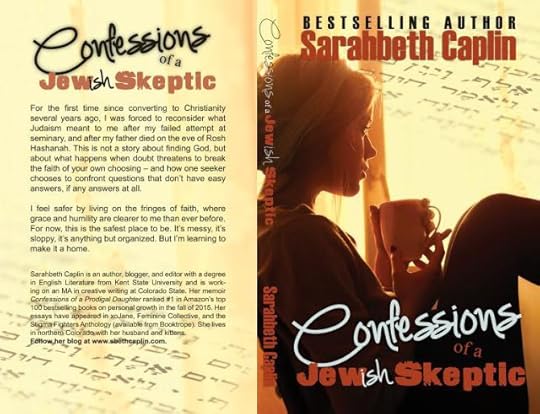
Filed under: Religion, Writing & Publishing Tagged: Author Sarahbeth Caplin, Christian culture, Christianity, evangelicals, hell, Judaism, Seminary, Writing








April 22, 2016
I can’t trust my heart: the case for spiritual autonomy
I am so grateful for Christians like Elizabeth Esther who are dedicated to exposing the underbelly of spiritual abuse in many fundamentalist churches, as well as offering wisdom to people struggling with their faith after they escape. Spiritual Sobriety is one of a few books on self care after being hurt by a toxic faith environment. Others I’ve read recently are Faith Shift by Kathy Escobar and The Sin of Certainty by Peter Enns.
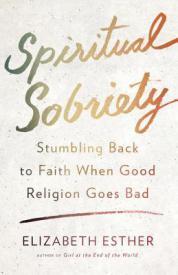 There’s a market for people bruised by faith communities I had no idea was out there. I’m so thankful for that; for proof that I am not alone in the struggle to recover the goodness of God that, at one point, turned my life upside down in the best possible way. I believe recovery is possible, but the road to healing is hard. It’s hard because of the reminder from small groups, Bible studies, and sermons over the years that my heart is wicked and deceitful, and therefore I cannot trust it.
There’s a market for people bruised by faith communities I had no idea was out there. I’m so thankful for that; for proof that I am not alone in the struggle to recover the goodness of God that, at one point, turned my life upside down in the best possible way. I believe recovery is possible, but the road to healing is hard. It’s hard because of the reminder from small groups, Bible studies, and sermons over the years that my heart is wicked and deceitful, and therefore I cannot trust it.
This idea comes from Jeremiah 17:9: “The heart is deceitful above all things.” A similar sentiment is found in Judges 17:6: “In those days Israel had no king; all the people did whatever seemed right in their own eyes.” In a recent blog post for Focus on the Family, an organization whose worldview closely aligns with that of my former college ministry, Adam Holz writes:
We live in a time that says feeling good on our own terms is what matters most. But it’s a false gospel. And a dangerous one, too. Because as much as I don’t like to admit it, my strong feelings aren’t always right, aren’t always aligned with truth. Only as I take those strong emotions to God, submit them to Him, and ask Him to work in and through me as I seek to follow Him are my feelings likely to be reflective of that truth.
No, our strong feelings aren’t always right. Our feelings can cause us to believe things about ourselves that are harmful and untrue. But feelings should not be ignored altogether. For those with anxiety and panic disorders, ignoring our feelings is extremely problematic. If I’m sitting in church listening to a sermon that triggers anxiety, it’s not healthy for me to stay. Stomach pains and diarrhea from being triggered are not healthy.
One of the best decisions I made for my faith recently was to stop attending services at the church where I had an anxiety attack, and sit outside the sanctuary in the lobby area with my Bible and prayer journal while my husband worships there. I’m not without community, either, because after church we join our friends from small group for lunch. In addition, I attend a weekly Bible study with the same group. This is one example of when listening to my feelings was a very good decision.
Both Esther and Escobar recommend taking breaks from reading Scripture or attending church if it’s just too stressful at the moment. They aren’t saying we should quit either one, just take a break – but I imagine that Christians like Holz would call that suggestion blasphemous. Christians like Holz may feel “convicted” to tell me I’m wrong in pursuing this track toward healing. But according to his own theology, Holz’s heart can’t be trusted, either. He knows what’s best for my spiritual life way less than I do.
In both ministry and in seminary, faith was not supposed to be messy or gray. There was only right and wrong, no in between, and putting down your Bible or skipping church was just not okay. I was inexplicably taught that I could never know what’s best for me, because my selfish heart was only interested in instant gratification. Apparently, only spiritual mentors of whom I was a sort of disciple could know. And somehow, the deceitfulness of their hearts was not an issue when taking their advice.
I wouldn’t call either group a cult, but both had explicitly abusive tendencies that I could not recognize at the time. Only after I left was I able to recognize the red flags. And you know what? I owe my life to self-care. Once I started believing that I was worthy of a safe space to worship and grow, everything started to change. I still struggle with feeling that I don’t deserve anything good, but I’m not as deep in the hole as I used to be.
While it’s generally a good idea to discuss important decisions with people who are close to you, spiritual autonomy cannot be dismissed. This does not mean worshiping in a vacuum, isolated in a cave somewhere. It means trusting the reason that God gave you when something feels “off,” because doing so could just save your faith…if not your life.
Filed under: Religion Tagged: Campus Crusade for Christ, Christian culture, Christianity, depression, evangelicals, grief, self-care, Seminary, Spiritual Abuse











